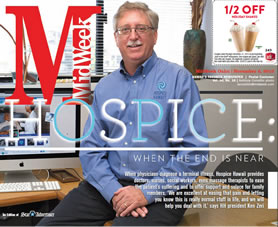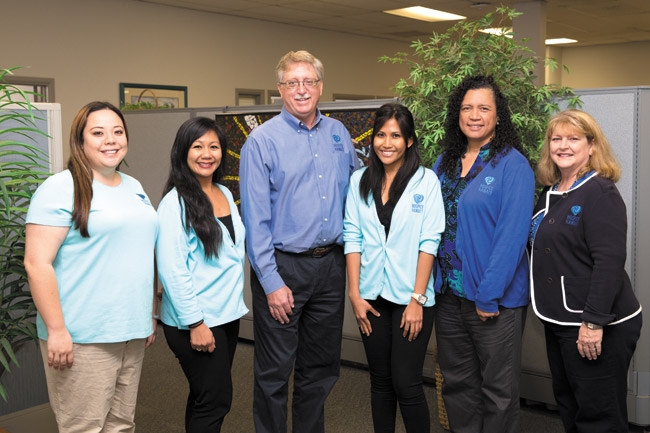Hospice: When The End Is Near
When doctors diagnose a terminal illness, Hospice Hawaii provides doctors, nurses, social workers, even massage therapists to ease the patient’s suffering and to offer support and solace for family members
There are only two things we share with every creature that ever drew breath on this earth: We each were born, and we each will die.
mw-cover-110613-hospice-1
Yet while death is guaranteed for us all, most of us treat it as Congress treats the debt ceiling and kick it down the road for another day.
But what happens when death does come for you or a loved one? How does one deal with the issues that we never wanted to think about but are coming no matter how much we deny it?
Helping thousands of local residents deal with death with grace, dignity and peace is the call of Hospice Hawaii (HH), the only completely local hospice organization on Oahu, which is celebrating its 35th anniversary this year.
“At the very core of what we do is that our team of professionals and volunteers go to a place of uncertainty in a family’s life cycle,” says HH president Ken Zeri.
“It is a place of loss of someone they love. My team goes and is present for all of that suffering and uncertainty, and they say, ‘We have done this before with other families and we do it with you now.’ They walk with them, they ask what is a value in your life now even in the midst of this life coming to a close? What is important to you and how can we help you achieve that? That is the beauty of our mission.”
The hospice movement in America began in the 1970s. As medical advances were skyrocketing, they found that more people were now dying in hospitals fighting diseases even after all avenues for curing the patients had been exhausted.
Spending your last few days on earth under fluorescent lights with septic smells is not ideal for anyone, so the idea came out that once death has become inevitable, patients are moved into a new kind of care: hospice care.
Congress put forth a pilot project called the Medicare Hospice Benefit in 1982, which it turned into law in 1986 as a way to ensure all Americans could have dignity and tranquility on their way to the other side.
“With this legislation, the federal government essentially declared that hospice care was so important in relieving suffering and in bringing about a peaceful and meaningful closure to life, that every citizen was entitled to it, regardless of ability to pay,” says Zeri, who’s been president of HH for the past 11 years. “Although federal reimbursements for providing hospice care have fallen behind the real costs of this care, this benefit nevertheless has supported the growth of quality end-of-life care for all Americans.”
Today, more than 1.6 million people per year in America utilize hospice care, which is designed to take care of you for up to the last six months of your life. Here in the Islands, about 38 percent of deaths occur under hospice care, with the average stay 18 days and some lasting more than a year.
Hospice care, for the most part, takes place in your home, with HH bringing the medical supplies and personnel to your residence. It does have a five-bed facility in Kailua for those with nowhere to go, but most people prefer to die in their own homes. The focus of hospice is palliative. Pain management is the No. 1 priority for the patient – finding the balance between finding comfort and not being too sedated to enjoy your last days with your loved ones.
“Albert Switzer once said, ‘The fear of pain is a more terrible lord over mankind than death itself,'” says Zeri. “We are excellent at easing that pain and letting you know that this is really normal stuff in life, and we will help you deal with it.”
Once the physical issues have been addressed, all the concerns the brain can muster come floating to the surface.
“In order to ease those fears, you mostly just speak the truth. People are afraid of the things that they don’t talk about or don’t know,” says Zeri, who started in the business in 1986 as a hospice nurse in San Diego after he got out of the Navy. “The families are afraid of making a mistake, and patients often say they do not want to be a burden on their families. We can show them that by allowing them to take care of you as you are coming to the end of your life, it is a gift to the family.”
The staffing at HH is built to address any of your concerns, with three physicians on staff, as well as social workers, chaplains and even massage therapists. They all are trained to answer the hard questions that come with the end of life, and they encourage you to relieve your tension on them.
“We welcome them, we don’t push them back,” says Zeri, who speaks in quiet, measured tones. “It is OK to call and be panicked. I know this is a hard time, I can handle your panic, bring it. Let’s talk about death – not as something to be feared, but as something that is real.”
One of the items they talk about is creating a POLST – physician’s orders for life-sustaining treatment – which is similar to an advanced directive or living will, about how you would like caregivers to proceed if you expire. The difference with a POLST, which Zeri helped become law in Hawaii, is that it is a doctor’s orders and therefore must be followed by EMS or hospital personnel anywhere in the state.
“The hardest time to make a decision about care is during a crisis. The instinct is to say, ‘Do everything!’ out of panic,” says Zeri. “But by completing a POLST, it is a gift to your family so that they are not burdened with thinking, ‘Am I doing the right thing? Is this what they wanted?’ And you know it is, because it is written down.”
Unfortunately, death doesn’t always come at the end of a long and fruitful life. Sometimes lives are cut way too short, and HH is equipped to help children when they are called away too soon. It is staffed with art and play therapists, who can help children understand what is happening to them, but even more so, just ease their pain and make their last days as fun as possible.
“I think of them as our at home-care team, and my kids don’t even really know what a hospice is, they just think Aunt Julia is coming by to play,” says one client. “They are like extended family, and I could not have been functioning with the peace I am without them.”
Her 10-year-old daughter has been battling cancer for many years and now is approaching the end, and she is so thankful for all the help HH has given her with everything from paperwork to preparing their younger son for what is to come.
In order to continue helping families like these and the thousands who die every year, HH is sponsoring its annual Na Hoa Malama wine-tasting fundraiser this Saturday at Waialae Country Club. The funds are used to help provide services to those who don’t have insurance or can’t afford hospice services. Each year HH honors former patients, and with this year’s theme “Journey to Japan,” it honors two Japanese-Americans who died recently: Frank Tanabe, a World War II linguist, and Dr. Allan Izumi, a well-respected dermatologist and professor at UH John A. Burns School of Medicine.
“Hospice Hawaii was there on many levels for us, not just the physical, but emotional,” says Dana Izumi, widow of Dr. Izumi, who died in June of last year. “We knew we had someone we could speak to who understood exactly what we were going through, and sharing the resources we needed from physicians to a masseuse. It was a tremendous source for us and gave us peace of mind handling our new situation.”
While dying remains a subject most of us like to give as little thought as possible, it is good to know that, when our time comes, there is someone there to hold our hand as we walk into the dark.
“It is a practice that requires a genuine human approach, and I really like that,” says Zeri. “When I was in the Navy, the goal was to treat ’em and fleet ’em. We redefine success in hospice care. Did we ease their pain? Did we understand this journey for them? Did we help them bring this life to a closure?
“Because life does come to a close, we are not immortal, and in the midst of it there is an opportunity for us to be taught lessons about what is important in life. Even in the knowing that the people we care for are going to die, we have an opportunity to have our own life improved, if we are smart.”







